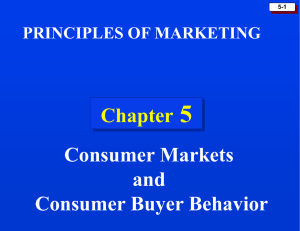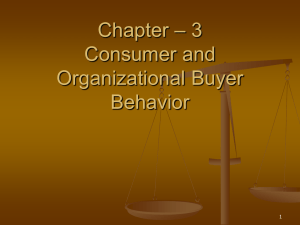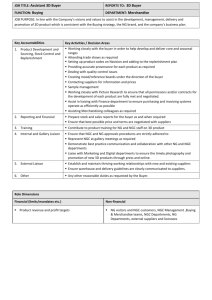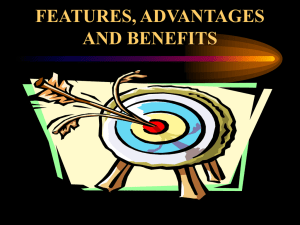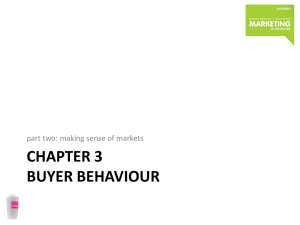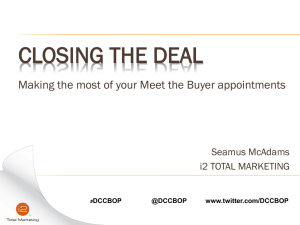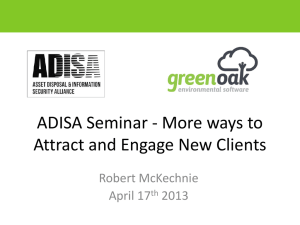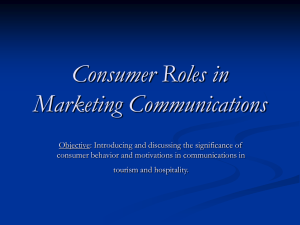mkt304ch5and6 - brandluxuryindex.com
advertisement
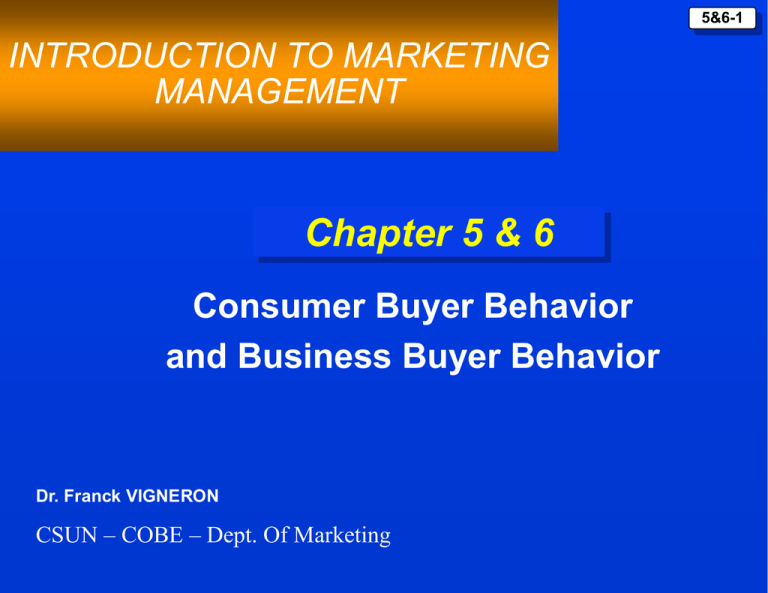
5&6-1 INTRODUCTION TO MARKETING MANAGEMENT Chapter 5 & 6 Consumer Buyer Behavior and Business Buyer Behavior Dr. Franck VIGNERON CSUN – COBE – Dept. Of Marketing Consumer Buying Behavior • Consumer Buying Behavior refers to the buying behavior of final consumers individuals & households who buy goods and services for personal consumption. • The central question for marketers is: “How do consumers respond to various marketing efforts the company might use?” 5&6-2 Model of Buyer Behavior Product Price Marketing and Other Stimuli 5&6-3 Economic Technological Place Political Promotion Cultural Buying Decision Process Product Choice Brand Choice Dealer Choice Buyer’s Black Box Buyer’s Response Buyer Characteristics Purchase Timing Purchase Amount 5&6-4 Factors Influencing Consumer Behavior Cultural Social Culture Reference groups Subculture Family Social class Roles and status Personal Age and life-cycle Occupation Economic situation Lifestyle Personality and self-concept Psychological Motivation Perception Learning Beliefs and attitudes Buyer Factors Affecting Consumer Behavior: Culture 5&6-5 Culture • Most basic cause of a person's wants and behavior. • Values, Perceptions, Wants & Behavior Subculture • Groups of people with shared value systems based on common life experiences. • Hispanic Consumers • African American Consumers • Asian American Consumers • Mature Consumers Social Class • Society’s relatively permanent & ordered divisions whose members share similar values, interests, and behaviors. • Measured by: Occupation, Income, Education, Wealth and Other Variables. Factors Affecting Consumer Behavior: Social Groups •Membership •Reference Family •Husband, wife, kids •Influencer, buyer, user Roles and Status Social Factors 5&6-6 Factors Affecting Consumer Behavior: Personal 5&6-7 Personal Influences Age and Life Cycle Stage Occupation Economic Situation Personality & Self-Concept Lifestyle Identification Activities Opinions Interests VALS 2 5&6-8 Actualizers Abundant Resources Principle Oriented Status Oriented Action Oriented Fulfilleds Achievers Experiencers Believers Strivers Makers Strugglers Minimal Resources Factors Affecting Consumer Behavior: Psychological 5&6-9 Motivation Beliefs and Attitudes Psychological Factors Learning Perception Maslow’s Hierarchy of Needs Self Actualization (Self-development) Esteem Needs (self-esteem, status) Social Needs (sense of belonging, love) Safety Needs (security, protection) Physiological Needs (hunger, thirst) 5&6-10 The Buyer Decision Process Need Recognition Information Search Evaluation of Alternatives Purchase Decision Postpurchase Behavior 5&6-11 The Buyer Decision Process Step 1. Need Recognition Need Recognition Buyer Recognizes a Problem or Need Internal Stimuli • Hunger • Thirst • A person’s normal needs External Stimuli • TV advertising • Magazine ad • Radio slogan •Stimuli in the environment 5&6-12 The Buyer Decision Process 5&6-13 Step 2. Information Search Personal Sources Commercial Sources Public Sources Experiential Sources •Family, friends, neighbors •Most effective source of information •Advertising, salespeople •Receives most information from these sources •Mass Media •Consumer-rating groups •Handling the product •Examining the product •Using the product The Buyer Decision Process Step 3. Evaluation of Alternatives Consumer May Use Careful Calculations & Logical Thinking Consumers May Buy on Impulse and Rely on Intuition Consumers May Make Buying Decisions on Their Own. Consumers May Make Buying Decisions Only After Consulting Others. Marketers Must Study Buyers to Find Out How They Evaluate Brand Alternatives 5&6-14 The Buyer Decision Process Step 4. Purchase Decision Purchase Intention Desire to buy the most preferred brand Attitudes of Others Unexpected Situational Factors Purchase Decision 5&6-15 The Buyer Decision Process Step 5. Postpurchase Behavior Consumer’s Expectations of Product’s Performance Product’s Perceived Performance Satisfied Customer! Dissatisfied Customer Cognitive Dissonance 5&6-16 Stages in the Adoption Process Awareness Interest Evaluation Trial Adoption 5&6-17 5&6-18 Early Majority Innovators Percentage of Adopters Adopter Categories Early Adopters 34% Late Majority 16% 13.5% 2.5% Early Laggards 34% Time of Adoption Late Influence of Product Characteristics on Rate of Adoption Communicability Relative Advantage Can results be easily observed or described to others? Is the innovation superior to existing products? Divisibility Product Characteristics 5&6-19 Compatibility Does the innovation fit the values and experience of the target market? Can the innovation be used on a trial basis? Complexity Is the innovation difficult to understand or use? What is a Business Market? 5&6-20 • Business Buyer Behavior refers to the buying behavior of all the organizations that buy goods and services for use in the production of other products and services that are sold, rented, or supplied to others. • The business market is huge and involves many more dollars and items do consumer markets. Characteristics of Business Markets 5&6-21 Market Structure and Demand • Fewer, larger buyers • Geographically concentrated • Demand derived from consumers • Fluctuating demand Nature of the Buying Unit • More buyers • More professional purchasing effort Types of Decisions & the Decision Process • More complex decisions • Process is more formalized • Buyer and seller are more dependent on each other • Build close long-term relationships with customers Model of Business Buyer Behavior Product Price Marketing and Other Stimuli Economic Technological Place Political Promotion Cultural Organizational Influences Product or Service Choice The Buying Organization The Buying Center Buying Decision Process Buyer’s Response 5&6-22 Interpersonal and Individual Influences Delivery Terms and Times Supplier Choice Service Terms Order Quantities Payment Business Buying Situations Involved Decision Making New Task Buying Modified Rebuy Straight Rebuy 5&6-23 Participants in the Business Buying Process: The Buying Center Gatekeepers 5&6-24 Users Buying Center Buyers Deciders Influencers Major Influences on Business Buyer Behavior Environmental Economic, Technological, Political, Competitive Organizational Objectives, Policies, Procedures, Structure, & Systems Interpersonal Authority, Status, Empathy & Persuasiveness Individual Age, Education, Job Position, Personality & Risk Attitudes Buyers 5&6-25 Stages of the Business Buying Process Problem Recognition General Need Description Product Specification Supplier Search Proposal Solicitation Supplier Selection Order Routine Specification Performance Review 5&6-26
